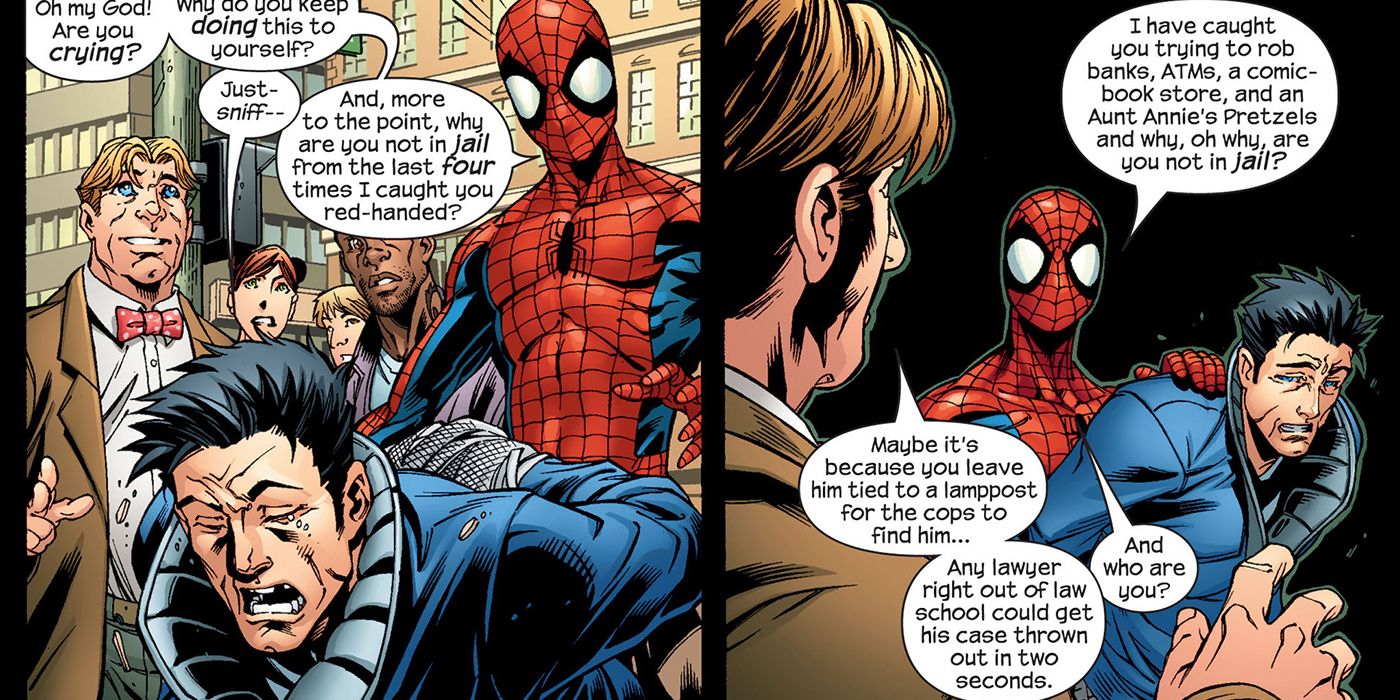Whether its a bank heist or Doctor Octopus, Spider-Man has one of the most iconic methods of leaving defeated criminals behind, typing them up in his signature webbing for the incoming police to find and arrest. While this method has proved to be useful in helping the authorities, an issue of Ultimate Spider-Man suggests that Spidey’s idea of wrapping things up might actually do more harm than good, advice given to him by Nelson and Murdock’s own Foggy Nelson.
In Ultimate Spider-Man: Annual #2 by writer Brian Michael Bendis and artist Mark Brooks, Spider-Man is yet again defeating his consistently underwhelming enemy Herman Schultz aka the Shocker. Laughing that the only thing shocking is how often the wall-crawler runs into the horrible bank robber, Spider-Man asks why he isn’t in jail, listing their last four encounters as enough proof for him to be incarcerated. Fortunately for Spidey, Franklin Nelson happened to be nearby and answers that his method of leaving criminals could easily get the case dismissed by any lawyer in a courtroom due to the circumstances.
Foggy tells Spider-Man that if he physically brings him to the police and presses charges, with the adequate witnesses present, the now-crying Shocker will go away for a few years. The young superhero follows Foggy’s advice and climbs through the window of a nearby precinct, carrying the webbed up Shocker. Fortunately, Spider-Man’s relationship with Captain Jean DeWolff, unaware that she’s a dirty cop involved with the Kingpin, allows him to do so and the Shocker is lead away to be processed, again.

Bendis’ explanation through the use of Foggy, a character he worked on during his Daredevil run, is a hilarious yet logical way to explain why Spider-Man has continued to keep running into the same criminals throughout the years. While many of the bigger names usually manipulate or flat out escape their incarceration, any good lawyer could argue that Spider-Man, a masked vigilante, does not have the authority to assault citizens regardless of if they are guilty or not. The explanation also continues to remind that despite his accomplishments, this version of Spider-Man is still a teenager who’s technically been Spider-Man for barely a year. In a world full of powerful superheroes and supervillains, Spider-Man has to live and learn the rules every time he puts on his signature costume.
Although he listened to Foggy that one time, it would appear that the young Spider-Man either ignored Foggy’s information or forgot it thanks to the insane amount of events that’d follow this issue. Ultimate Spider-Man brought up a question that could even apply to his mainstream counterpart, are Spider-Man’s methods doing him more harm than good? While that could be the subject of its own article, if you thought the paperwork over Spider-Man‘s methods were a headache, you can only imagine what Gotham lawyers think of Batman.





